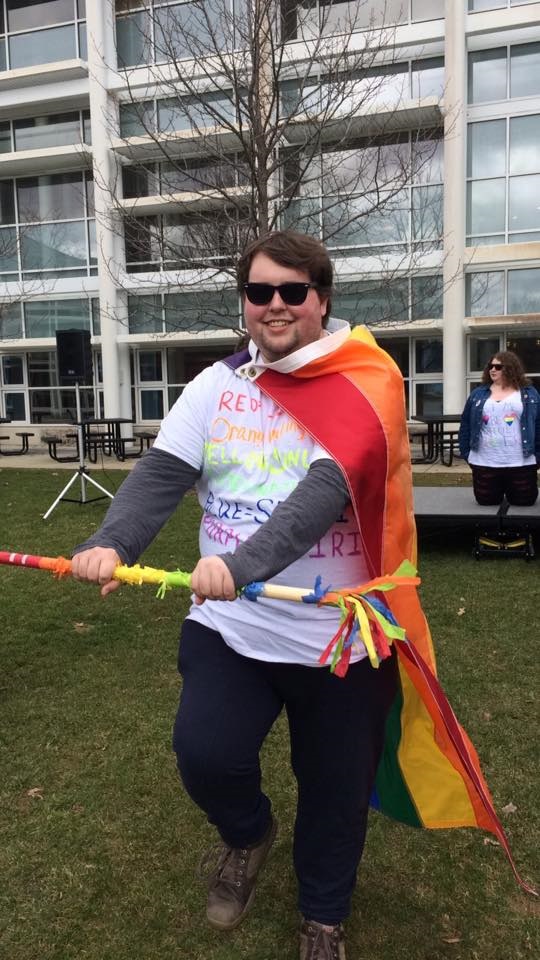Please sign up for InDepthNH.org’s free Greetings from Sam: Hi all, it is my privilege to be stepping in for the lovely writers and creators of The Gay Agenda: Tori Tucker and Emma Simpson. Their decision to step back is the door opening for me to step in. Hopefully, this means I can cultivate a rapport with you. I hope to continue to capture the unique perspective of being queer, a student in New Hampshire, and share a bit of my life with you all. Human connection is one of the deepest, most powerful feelings we experience in life. The look on someone’s face as we get to know each other is a wonder to see. This is the foundation of friendship, the first step even to a romantic relationship. Some people may even feel it is a spiritual experience, calling it universal energy that has brought them together. Why then does it feel different as a queer individual? What is getting in the way of this intense, personal connection? It is not for a lack of desire — I find myself wanting to be friends with my fellow students, co-workers and so on. However, when one is queer, meeting a new person is often a much more difficult experience. When encountering a new person, one can observe many qualities about them: their clothing and their style, the cut of their hair, a general sense of age and so on. What is more difficult to detect is hatred and bigotry. Not all homophobic people wear their feelings on their sleeve. They may not let others know about their beliefs. Some people may even think that I don’t deserve equal rights and that I should burn in hellfire. Because of this, I find myself guarded when meeting new people even when meeting someone I strongly suspect is queer like me. There have been times that I have gone the entire span of a friendship without letting the other person know how I identify. Now, before someone suggests that “gays don’t need to shove their identity into everyone’s face all the time,” let me tell you about this specific friendship. It was a working friendship with a girl who worked at the same place and on the same shift. When there were no customers we would talk and she was really nice. As conversations are wont to do, ours ranged all over the place and we began to get to know each other. And one evening, we got to talking about relationships. She talked about her relationship for a while and when she politely asked about anyone I was seeing, I finally decided to tell her. I was seeing a guy at the time (that relationship is long over, if anyone is curious) and I spoke about him a bit. In the beginning, I was using very gender neutral language, but she caught on. So I decided I didn’t have much to lose (and in fairness, she was very accepting). She immediately said something along the lines of, “Oh, I would never have guessed!” Which begs the question: Why do others need to guess? Why do we have to assume one another’s sexuality at all? Does it really make much of a difference to make no assumption and learn information when it is offered? Those questions aside, I smiled and laughed a bit. She didn’t seem overly troubled, but it was a reaction all the same. A reaction I know wouldn’t have happened had I mentioned a girlfriend. The scary thing is that sometimes those reactions aren’t positive. The one I experienced was pretty neutral. But what if she didn’t like what she heard? I am not responsible for anyone else’s feelings, but I also have to work with, live with, or go to class with someone who might actually hate gay people. Violence against queer individuals is not a thing of the past. It seems like every week I read about another queer individual being assaulted or even killed. More disheartening, some families then try to “straightwash” the victim’s life. Ultimately, meeting a new person is a more involved interaction for a queer person than it is for a cis and straight individual. Meeting a new acquaintance is always a guarded experience. I can go in hoping for the best because I am an optimist. I am also pragmatic. I know that sometimes people have prejudices against someone like me that could place me in danger, or at least make me feel uncomfortable in a way a straight individual will never experience. Some of my best friends are cis and straight. I don’t hold this against them at all. However, I recognize this as the toxic baggage of a society still trying to emerge from a bigoted and hateful past (in terms of social justice). I recognize that for as long as I live in this country, perhaps even the world at large, this is the price I will pay. I have to always be on my toes. Which is why, of my straight friends, I really am appreciative of the sense of safety I feel around them. And among my queer friends, we notice that this is why some people (the very same ones who make us feel unsafe) mock our safe spaces. Among other queers, we understand the constant fear of a sudden and negative reaction. We can understand each other’s desire for a place or sense of comfort and acceptance. Having lived those fearful feelings, I don’t want a new queer friend or acquaintance to ever for a moment feel like I might be the one to react badly.  Sam Whitaker[/caption]
Sam Whitaker[/caption]
Getting To Know You Is A Little Trickier When You Are Gay Like Me
|

Sam Whitaker writes The Gay Agenda for InDepthNH.org and Manchester Ink Link.




